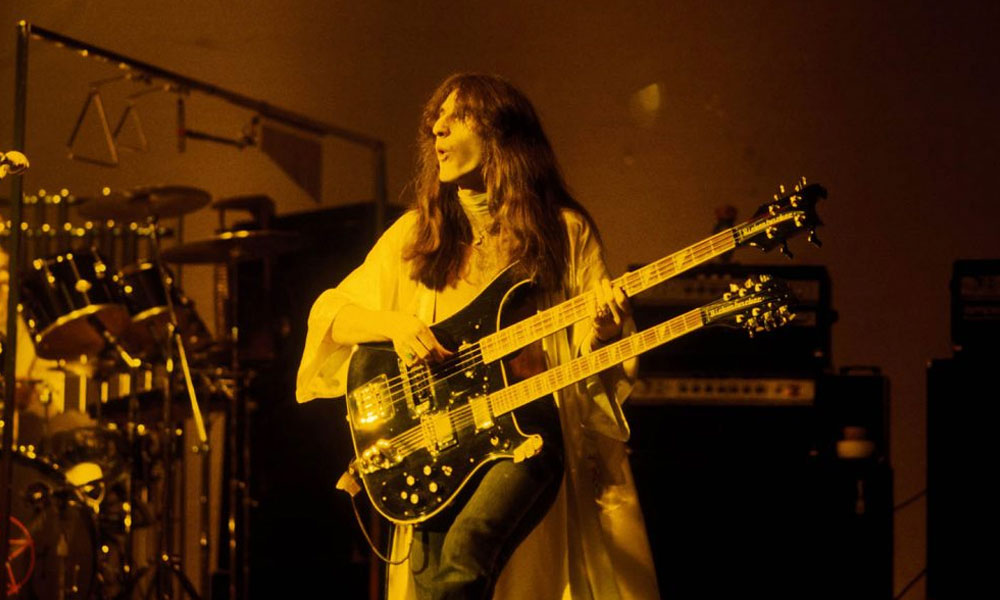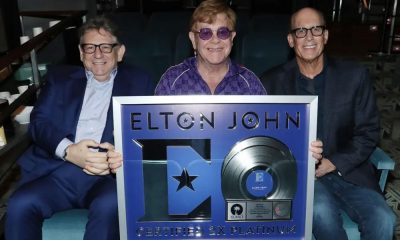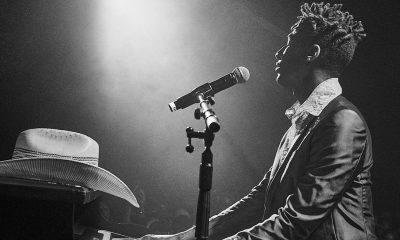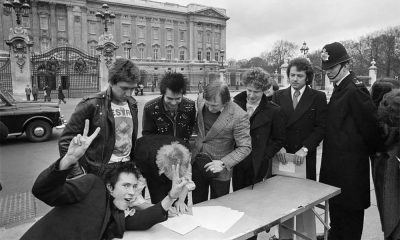News
The Best Prog Rock Bassists: 20 Essential Musicians


The bass player is traditionally the “quiet one” in a band – or as Spinal Tap’s Derek Smalls would put it, the lukewarm water. But that’s seldom the case in prog rock, where bassists have been responsible for classic riffs, mighty bottom ends, and even a few dazzling solos. In this list of the best prog rock bassists ever, we jump into the deep end, and salute the four-stringers (or, in some cases, eight or 12) that put the bottom into prog.
Think we missed one of the best prog rock bassists? Let us know in the comments below.
20: Nic Potter (Van der Graaf Generator)
Van der Graaf made do without a bass player for much of its career, but Potter was essential on two early albums, and again on the 1978 live set Vital. It’s his work on the latter that lands him here, playing some of the dirtiest, punk-inspired bass ever captured on a prog album – no surprise he wound up in a punk band (the Tigers on A&M) just afterward. He also has the most offbeat credit of anyone on this list: That’s him on the live side of Chuck Berry’s London Sessions.
19: Tal Wilkenfeld
This Australian prodigy made her name as a monster of fusion bass, stealing the show in her touring stints with Chick Corea and Jeff Beck. Later touring solo, and releasing the album Love Remains, she proved to be more about sophisticated songwriting, hinting both at prog and the jazz-inspired pop of Joni Mitchell. Anyone who’s recorded with both Todd Rundgren and Trevor Rabin earns her place on a prog list.
18: Scott Thunes (Frank Zappa)
The last of Frank Zappa’s regular bassists, Scott Thunes served the longest stint and arguably had the most on his plate. Recording and touring with Frank all through the ‘80s, Thunes got called on to play everything from hit singles (that’s him doing the fearsome lead bass on “Valley Girl”), to revived Mothers oldies in concert, to the endlessly complicated charts of Zappa’s final, large-band tour.
17: Billy Sherwood (Yes, etc.)
Sherwood is one of those musical brainiacs that seem to abound in modern prog; on numerous band projects (including the Prog Collective and many tribute albums) he plays every instrument and sings masses of vocals. In Yes alone he’s played keyboards, guitar, and bass in separate stints. But he played bass well enough to impress his friend Chris Squire; as a current Yes member he can successfully evoke Squire’s style without copying it.
16: Esperanza Spalding
Like many open-minded jazz players, Esperanza Spalding has kept a foot in rock – and when she rocks, she’s undeniably proggy. Best example is the 2016 album Emily’s D-Evolution, whose best moments suggest what Rush and Crimson might sound like if they had strong frontwomen and a grounding in R&B. With producer Tony Visconti aboard, there’s also some Bowie-esque playing with identity. So far it’s a one-off in her catalogue (though there are proggy moments on the followup, 12 Little Spells) but her work will likely continue to fascinate.
15: Les Claypool (Primus, etc.)
Of all the bass heroes in the modern jam-band circuit, Les Claypool is the clearest about his love for vintage prog – especially for Rush, a love he shares with his Primus bandmates who took up a full-blown tribute tour in 2022. But Claypool’s references go in other directions as well: He has roots in funk, metal, and fusion and draws those all together, with his quirky sense of humor, to create a style of his own. That’s what being progressive is all about.
14: Pekka Pohjola (Wigwam, solo)
Originally the bassist for Finland’s best (and probably only) internationally known prog band Wigwam, Pohjola always worked melodic ideas into his basslines, suggesting that he was itching to branch out as a composer. The 1977 solo album The Mathematician’s Air Display is perhaps the best demonstration of his skills, and features some of the tastiest guitar work Mike Oldfield did outside his own albums.
13: Glenn Cornick (Jethro Tull)
Jethro Tull arguably had more great bassists than any prog band this side of Zappa, but cofounder Cornick stands out for his jazz influence, which was key to Tull’s earlier sound. He also has the rare distinction of having played a bass solo on a UK hit single, “Bouree.” After Tull he was the founder and main songwriter of the overlooked Wild Turkey, whose material was heavily bass riff-driven.
12: Percy Jones (Brand X, sessions)
One of the great prog rock bassists, the sound of Jones’s plucked Wal fretless is completely individual, and it took the lead on many of Brand X’s signature pieces – most notably his composition, the dizzingly energetic “Malaga Vergen.” Also note the beautifully atmospheric use that Brian Eno made of his sound on the instrumental, “Energy Fools the Magician.”
11: Julie Slick (Adrian Belew, Echotest)
Ex-Crimson member Adrian Belew is always at his best when he has musicians who can chase and challenge him, and given his level of virtuosity, that’s a pretty tall order. But he met his match in this young firebrand of a bassist, and their onstage interplay can be downright thrilling. Check the various live versions of “Ampersand” to see the kind of sparring they get into, all within the confines of a heavy rock tune. Slick’s own band Echotest also displays a mix of technical chops and melodic smarts.
10: Dave Pegg (Jethro Tull, Fairport Convention)
This great player tends to get pegged (sorry) as a folk-rock bassist, due to his long stint in Fairport Convention. But he also helped make them a harder-rocking outfit, when he replaced the more traditionally-minded Ashley Hutchings. And he came into Tull just as they were coming out of their folk-rock period, venturing into the modern rock territory of A and Broadsword & the Beast. His folk background meant that he could add a sprightly touch to the trickiest parts.
9: Holger Czukay (Can, etc.)
Can’s cofounder never considered himself a proficient bassist, but that’s beside the point: He expanded the sonic and textural possibilities of bass guitar, laying down some of the quirkiest grooves ever recorded. “Pinch” and “Soup” (both from 1972’s Ege Bamyasi) were left-field yet funky, and proved highly influential. In later years Czukay collaborated with some of his admirers, notably PiL’s Jah Wobble and U2’s The Edge.
8: Hugh Hopper (Soft Machine, etc.)
A key player in the fertile Canterbury scene, Hopper didn’t so much step over the jazz/rock/avant-garde boundaries as ignore them completely. His playing on “Facelift” (one of four side-long tracks on Soft Machine’s Third) is a bass catalogue in itself – from the drones in the opening atonal section, to the heavy riffage as the piece fires up, to the eerie calm at the end, where Hopper is apparently playing forwards as the rest of the band is recorded backward.
7: Jon Camp (Renaissance)
The classic Renaissance lineup was one of the few without a lead guitarist (Michael Dunford played only acoustic), and their keyboardist John Tout was strictly classically-oriented. That left Camp to put the rock into Renaissance’s prog: His basslines were upfront, muscular, and on a track like “Running Hard,” the de facto lead instrument. His solo on the long Carnegie Hall version of “Ashes Are Burning” is a stunner too.
6: Greg Lake (ELP, King Crimson)
When you’re playing with one of the flashiest drummers and most flamboyant keyboardists in prog history, you’d better be a rock-solid prog rock bassist. That was Greg Lake’s job in ELP (when he wasn’t singing or playing acoustic guitar), and he held down that bottom end with mighty power: Check “Fanfare for the Common Man,” where he anchors the jam with a riff derived from John Lee Hooker. Or the “Blues Variation” section of Pictures At an Exhibition, where he kicks his bandmates into action.
5: Mike Rutherford (Genesis)
Long before he took over the lead guitar slot in Genesis, Mike Rutherford played bass like a frustrated lead guitarist. And that was a wonderful thing, resulting in some of the band’s most muscular moments – the fuzz bass lead in “The Lamb Lies Down on Broadway,” the busy riffing in “…In That Quiet Earth,” the barrage of rhythm in “Los Endos.” As if that wasn’t enough, he could then turn around and play something as gentle as his own composition, “Ripples.”
4: John Wetton (King Crimson, Asia, Family)
John Wetton was so good at singing – and so famous for it in his Asia days – that his greatness as a prog bassist tends to get overlooked. But look no further than a vintage King Crimson track like “Larks Tongues in Aspic, Part 1,” where his wah-wah bass put the fuel in a ferocious jam; or to the heavy bass riff on UK’s “In the Dead of Night.” He was also one of the few prog rock bassists with a solid grasp of funk; check Family’s “Burlesque” for proof.
3: Tony Levin (King Crimson, etc.)
Levin is probably the leading player of the Chapman Stick, a twelve-stringed monolith that enables the player to take on basslines, chords, and melody lines simultaneously – if, of course they’re up to the task. It’s the perfect tool for modern-day King Crimson, where polyrhythms are the thing. For all the exploration he gets into, Levin never overwhelms the song; he was the bassist of choice for all the A-list songwriters (James Taylor, Paul Simon, Peter Gabriel) before getting into Crimson.
2: Geddy Lee (Rush)
Rush was unique among power trios in that everybody played lead pretty much all the time. A good Rush piece hits you with so much information that you don’t always register who’s playing what. But Lee’s dexterity on the bass is impossible to miss, as is his full-blooded tone. The supremely tricky instrumental “YYZ” will always be one of those pieces that young prog rock bassists will try to master – and once they’ve done that, later Rush instrumentals like the multi-part “Leave That Thing Alone” are even more of a masterclass.
1: Chris Squire (Yes)
Perhaps an obvious choice, but Squire was a giant and the most distinctive of prog rock bassists, with a Rickenbacker tone to die for: One lick and you know it’s him. He provided the instrumental hook of many key Yes tracks; playing lead on the opening of “Roundabout” while guitarist Steve Howe is on acoustic. He could be subtle and supportive when necessary – but for pure sonic thrills check out his opening solo of Yes’ “On the Silent Wings of Freedom.” Or the Rick Wakeman solo track “Crime of Passion,” where he enters two minutes in with a dramatic monster riff.
Looking for more? Discover the Greatest Prog Rock Albums Of All Time.

-
Paul McCartney And Wings To Release Historic Live Album ‘One Hand Clapping’
-
Elton John Earns Multi-Platinum Plaque For ‘Diamonds,’ Shares ‘Step Into Christmas’ EP
-
Jon Batiste Announces ‘Uneasy Tour: Purifying The Airwaves For The People’
-
Best Political Punk Songs: 20 Essential Anti-Establishment Tirades





